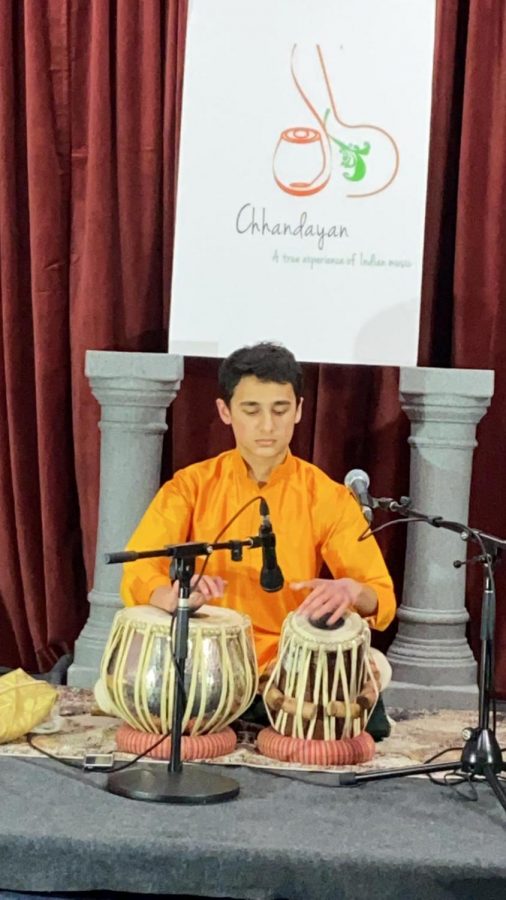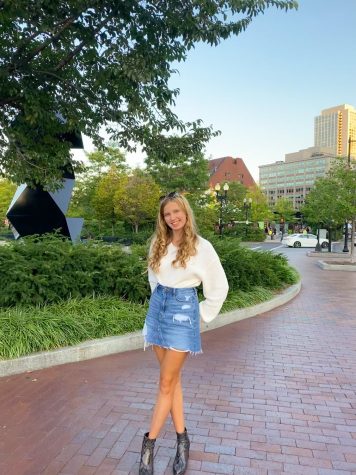Junior Aditya Phatak raises funds for Indian Artists in his inspirational concert series
Photo Courtesy of Aditya Phatak
Phatak concentrates during a performance. Phatak started playing Indian classical music at a very young age.
April 22, 2021
Junior Aditya Phatak learned how to play Indian Classical music before he learned English.
“When I [first started] learning from my guru, it was purely through the rhythm,” Phatak said. “He would just play something and I would kind of see the ways he was putting his fingers on a drum, what sound he’s making and I was just trying to replicate that as best as I could. [Music is] beyond language, you know, it’s its own form of communication and that’s what I like about it. I can communicate with other musicians, just purely through the drums.”
Phatak remembers his grandfather playing Indian Classical Music on a particular CD at home when he was young, and when his parents and grandparents noticed Phatak’s excitement for the music, his grandmother let him play with a set of drums. Soon after, four-year-old Phatak started lessons.
“My class wasn’t longer than like 15 minutes at that time because my attention span was also lower when I was younger,” Phatak said. “It was just these short bursts of a lesson where I’ll try to pick up something. When I started going to school I picked up English, [and my lessons got gradually longer].”
Getting into the habit of practicing was a challenge for Phatak, but slowly but surely, his practice became as vital to his day as brushing his teeth or putting on his pajamas.
“It’s a really important part of just not just being a complete musician but just being a complete person for me,” Phatak said.
Although he dabbles in many instruments, Phatak specializes in the Tabala, the principal percussion in most Indian classical music. At the start of the pandemic, Phatak dedicated the newfound time to honing his Tabala skills, but a few months later, he found a new calling.
“After those first three or four months [of the pandemic] went by, I realized what my guru [Pt. Samir Chatterjee] was already doing in India,” Phatak said. “He was trying to create like an ecosystem, as he calls, it for the artists there, who basically lost everything because of COVID. There’s no performances, there’s no income, so he wanted to create some kind of system for them where they can have a steady salary….”
When Phatak learned of Chatterjee’s mission, he was determined to find a way to get involved despite being in the US. He asked his guru about it after a lesson and was told that the biggest challenge of this mission was raising the funds to get the art centers his guru envisioned off the ground. So, Phatak started making some calls.
Phatak reached out to young people who are heavily involved in the local Indian Classical Music sphere in order to start a Performance Series to raise funds for struggling Indian Artists.
“These are people [younger than] 25 who want to make a difference,” Phatak said.
Getting the series off the ground proved to be a challenging feat for Phatak.
“It’s definitely been a learning curve for me because when I started [having meetings for the concert series], I was like, ‘okay, I got this. I contacted all these people I’m going to do like a Zoom meeting and we’ll come up with fantastic ideas right away,’” Phatak said. “When I started the Zoom meeting and there were big chunks of dead silence throughout the meeting like people on mute and, I mean, I guess I feel for our teachers now after that meeting. It started off kind of rough, but as people opened up, we came up with different themes that we wanted to do for our performances because Indian classical performances, you know, like a lot of people do that there are a lot of adult artists, professional artists that do them so we wanted to kind of stand out in that sense.”
His most recent performance’s theme was the “five languages of India,” in which the group presented five songs in five different languages that are spoken in India.
“We wanted those kinds of themes where we could catch people’s eye and get really creative with it instead of just, just playing music,” Phatak said.
The first performance took place on Feb. 6, 2021, and Phatak’s group plans to continue releasing one performance per month for the foreseeable future.
“Being a student of that music myself, I can feel for those artists,” Phatak said. “I mean I can relate to them, even though they’re living in India and I was born here, we still have that connection…. It kind of hurts to think that they’re suffering over there because of this pandemic…, so I knew I wanted to help them. It feels good that I can actually make a difference for them, even though I’m here.”
To watch Phatak and his peer’s performances and learn how to support his initiative, follow @chhandayan_youth_concertseries on Instagram.



